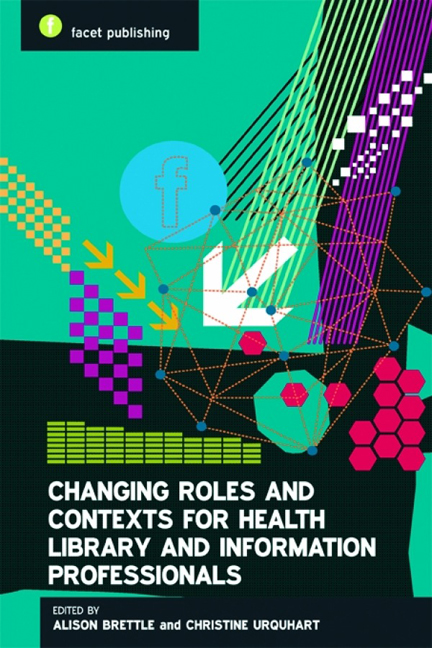Overview
Published online by Cambridge University Press: 08 June 2018
Summary
Introduction
Library and information professionals working in the health sector have faced challenges on many sides. Rapid developments in information technology and the provision of information coupled with constant organizational change in the public sector, the switch from local service provision to national agreements and the widespread adoption of evidence-based practice have ensured constant change for a number of years. How have library and information professionals met this challenge and how has this affected the roles they play? Will developments in electronic health information services render the hospital librarian obsolete? Is there a need for academic health librarians amongst the Google generation of students? Do health library and information professionals’ skills and knowledge remain relevant?
A profession is ‘a group of individuals who are recognized by the general public as having special knowledge, competencies and skills based on an extensive knowledge base, with extended education and training’ (Cleveland, 2011). It is worth keeping this definition in mind if we are to look forward and ensure that we can answer these challenges and ensure a continued need for health library and information professionals. Alongside, we need to examine the context in which we work, as well as the roles we play, and question whether the skills we have are suitable for those roles and potential roles of the future. This book seeks to do just that. It aims to encourage and inspire health library and information professionals to take on new opportunities and ensure their continued development and recognition as valuable assets in the changing health care environment.
This book does not aim to predict the future, nor highlight all the potential roles available, rather it examines the different contextual factors that may affect how health library and information professionals might work. It showcases a range of roles, whilst examining the skills needed to perform them, both now and in the future.
Changing contexts
Whilst not limited to the UK, a book such as this cannot avoid reference to the UK National Health Service (NHS), which has been subject to continual organizational change for a number of decades.
- Type
- Chapter
- Information
- Publisher: FacetPrint publication year: 2011

